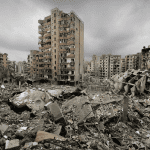Tearing down Andrew’s Palace in Luxor has recently been the subject of heated debate with circles interested in antiquities and heritage underscoring the value of the palace. However, officials denied that the palace was listed as an antiquity or a heritage building of a distinct character. This logjam raised questions about the difference between antiquities and heritage buildings, the laws that protect heritage and govern classification of antiquated buildings, and the role of the National Organization for Urban Harmony (NOUH).
Unlike what is commonly known, not all decade-old buildings are archeological, nor are all palaces and villas spread throughout Egypt protected by law against demolition. Protection against demolition and deformation requires that a building be listed under relevant laws, including the Antiquities Protection Law and Urban Harmony Law that allow for enumerating and protecting heritage buildings of distinct values. Unlisted buildings are not subject to protection by laws and are thus liable to demolition at any time. This was the case with Andrew’s Palace in Luxor.
In media coverages and on social media, the Andrew’s Palace was described as being an “antiquity”. However, officials at the Ministry of Tourism and Antiquities refuted this confirming the palace wasn’t listed as an antiquity. According to statements of Eng. Abdul Rahman Abu Saada, head of the NOUH, to a local newspaper “the Andrew’s Palace wasn’t listed in the NOUH lists.” In that connection, Dr. Suheir Hawas, Professor of Architecture at Cairo University and Member of the NOUH Central Administration, blew a surprise telling the heritage-concerned platform Bab Misr that “the Committee on Cataloguing Buildings of a Distinct Character in Luxor –charged with listing buildings that have a value such as the Andrew’s Palace– hasn’t come to work since the promulgation of Law No. 44 of 2006 till now, which consistently makes such buildings subject to demolition”.
NOUH’s Early Battles
NOUH was established by virtue of a Republican Decree in 2001, with its headquarters inaugurated in the Citadel in August 2004. It undertook the responsibility of restoring the aesthetic values of Egyptian cities, maintaining the look of buildings, upgrading urban spaces and archaeological areas, setting standards for billboards and ad banners in streets and over buildings, and preparing an extensive database of all heritage buildings of a distinctive nature in all governorates through NOUH-affiliated Committees on Cataloguing Buildings of a Distinct Character.
Since the establishment of NOUH, its battles with the executive authority never came to a halt. Ministers and governors have always seen NOUH’s role as a barrier standing in the way of development given the constraints that impede developing urban spaces particularly historical areas as well as restrictions on listed heritage buildings. Some officials of the executive authority even conceive of the NOUH role as being “advisory and non-binding”. This was expressly declared by a governor in a meeting with members of the cataloguing committee when one of the members opposed the governor’s decision to repurpose a governorate-owned listed heritage building in a way not compatible with its character and original function.
Dr. Samir Ghareeb, Former Head of the NOUH from 2004-2014, elucidates these battles saying: “When I took office, I simply thought that as long as the NOUH was established pursuant to a presidential decree by President Mubarak, then it is all set for urban development and state organizations has to attend to this. However, I found myself engaged in long-running battles with state officials as well as stakeholders to serve the NOUH purpose. I was more of Don Quixote fighting windmills.”
Over its 20-year history, the NOUH had significant successes as well as failures, the latter were predominantly the product of officials’ disregard of the NOUH role. Managing to list 6974 building nationwide till August 2021 is a considerable accomplishment of NOUH. Yet, this large number of buildings requires close surveillance to protect them against all types of abuses, starting from deformation to partial and full demolition. Given its limited resources and centralized administration in Cairo, the NOUH will not be able to take on this responsibility alone even if partially assisted with cataloging committees in governorates that aren’t without interferences and controls of executives, starting from the governor who approves reports of these committees to directors of engineering and planning departments who together with professors of architecture, history, arts, and structural engineering who constitute membership of these committees. Under the law, the governor has discretion to restructure cataloging committees whenever he deems necessary whereas the NOUH Head preserves the right to name the chairperson of the committee who gets appointed by virtue of a decision from the Minister of Culture. In some governorates, cataloging committees weren’t formed in the first place despite the NOUH correspondences to successive governorates over years, which exposed –and is yet exposing– heritage buildings in these governorates to demolition for failure to list them and, consequently, lack of a law that protect them from demolition
An example of heritage buildings listed with NOUH, Khedivial Cairo
If executives’ disregard of the role of NOUH can be considered one of the heads of heritage protection problematique triangle in Egypt, owners of listed heritage buildings represent a second head of this triangle. Consistently, owners of these buildings stand against recoding their property, or “freezing” them to use their words. Most of these buildings dates back to more than 75 years, their commercial and residential units are governed by the old rental act, and their ownership interests are transferred to descendants. Since the old rental act does not allow for owners to generate meaningful revenue, they often opt to demolishing them to take advantage of buildings’ ideal location in the city center, either by selling them as vacant land, or replacing them by multi-storey buildings. The Urban Harmony Act allows owners to file an appeal against listing of their property, where the Central Grievance Committee in Cairo conducts a physical inspection of the building, no matter where it is located nationwide, prepares a report on the building and its value, and decides whether to endorse the Cataloguing Committee decision or leave the building off the list.
The Difference between UNESCO-Designated World Heritage Sites and Archeological and Historical Buildings
The existence of a fragmented system for managing heritage assets can be considered the third head of the heritage protection problematique triangle in Egypt. Historical and archaeological buildings in Egypt are regulated by two legislation, i.e. one of the Ministry of Tourism and Antiquities and the other of the Ministry of Culture (MoC). Archeological buildings and sites are governed by Law No. 117 of 1983 on Antiquities Protection and its amendments of 2010, 2018, and 2020, which governs requirements for registering archaeological buildings and sites, which shall meet several criteria, notably “the passage of 100 years since the construction of the antiquity”, which would ensure it is of archaeological or artistic value or of historical importance. If such value or importance is lacking, the building isn’t likely be registered even it was over 7,000 years old.
An example of buildings listed with the Ministry of Tourism and Antiquities, Al-Moez Street, Fatimid Cairo (Source: Taken by the author)
As for buildings that haven’t been listed as antiquities yet have historic, architectural, or artistic value, witnessed historical events, were the place where famous figures lived, or meet any criterion of the foregoing, the Urban Harmony Law No. 144 of 2006 enables listing them as heritage buildings of a distinct character in the NOUH lists to protect them against demolition.
As for the world heritage sites designated by the UNESCO in Egypt, these were listed for containing cultural and natural heritage considered to be of outstanding value to humanity. Egypt has seven World Heritage Sites, six are cultural and one natural, namely Abu Mena in Alexandria, Ancient Thebes with its Necropolis in Luxor, Historic Cairo area, the Pyramid Fields from Giza to Dahshur, Nubian Monuments from Abu Simbel to Philae in Aswan, Saint Catherine Area, and Wadi Al-Hitan (Whales Valley) in Fayoum.
Will a Single Entity for Heritage Management in Egypt be Sufficient?
Perhaps one of the major reasons that led to the loss of several palaces and historical buildings that have great architectural and artistic values is the multitude of ministries and authorities concerned with heritage management in Egypt. Whenever a building is demolished, its “blood” is shed among tribes, as the saying goes, with every entity shifting the responsibility to the other and localities –that issued the removal and demolition permit– announcing the building wasn’t registered, let alone the building’s ownership rights and the right to dispose of it, which a ministry, governorate, or citizens may retain.
Examples of listed heritage buildings in London, Berlin, and Cairo, from right to left. (Source: Taken by the author)
In England, Historic England is the single entity that undertakes listing and managing more than 400,000 heritage buildings and sites, ranging from listed antiquities, heritage buildings, natural sites, historic battle sites, and shipwrecks. Similarly, in Italy, the Ministry of Culture takes on the responsibility of listing and managing historical sites, museums, and heritage buildings throughout Italy. Likewise, the French Ministry of Culture assumes the responsibility of listing and monitoring 40,000 registered heritage buildings across France. In the United States, the National Park services of the US Department of the Interior is responsible for listing of over 96,000 heritage assets all over the United States.
Realizing that the survival of these heritage buildings is a national goal and that they are part of the memory of cities and an important tourism resource, several countries resorted to granting owners of heritage buildings exclusive privileges, ranging from offering property tax exemptions and financial aid that aren’t refunded if the building is repurposed to mediating between investors and landlords. Perhaps this explains why heritage buildings’ owners in the United States strive to list their property to take advantage of these privileges. Further, in France, the state treasury affords up to 40 percent of the maintenance and repair bill for listed heritage buildings.
Working towards a solution to the problematique of heritage protection in Egypt is not possible without the involvement of owners of the 7,000 listed heritage buildings in the process of conserving heritage assets. In the absence of state’s willingness to offer buildings’ owners financial compensations or acquire these buildings and given the lack of effective alternatives that would offer owners a rewarding financial return causing them to deviate from the idea demolition and reconstruction and, owners resort to to different stratagems to avoid listing their buildings and thus having the ability to demolish them, being the only way to take advantage of them. Some of the proposed solutions in this respect could include offering owners concessional loans for restoration and maintenance of heritage buildings they own, placing these buildings on governorates’ investment maps to repurpose them, granting property owners tax exemptions for year, proposing solutions to issue of old rental act, and promoting the idea of selling vacant units in those buildings at the market price after renovating them jointly with investors, or re-letting them at a fair value by virtue of the new rental law.
While it may be currently difficult to bring together lists of the Ministry of Tourism and Antiquities hand NOUH under the umbrella of one entity, the government should reinforce the NOUH role legislatively so that its decisions are binding on all executive bodies rather than being considered a mere “advisory body.” In this vein, mention should be made of the commendable decision of giving NOUH the legal right to execution. As such, the NOUH managed to draft several reports in Cairo, Alexandria, and Port Said governorates and refer them to the Public Prosecution. Encroachments on those registered heritage buildings were removed. Additionally, the NOUH should have sub-headquarters in all governorates that help achieve its goals, starting from monitoring heritage buildings to protecting them against encroachments, toward complementing its role in upgrading the urban spaces in Egyptian cities.
References
- Hassan, A. (2021, August 24). “Ba’ad qarar hadm qaṣr Andrew’s: al-tansīq al-ḥaḍari lam yakun mūsagalan ḍimn qawaim al-gehaz” [“It wasn’t Included in the NOUH Lists”, NOUH Declares after Demolition Decision of Andrew’s Palace], Ad-Dustour.
- Properties inscribed on the World Heritage List in Egypt. Available at: https://whc.unesco.org/en/statesparties/eg
- Historic England Website. Available at: About the List | Historic England
- Website of the Italian Ministry of Culture. Available at: The History of the Ministry – Ministry of Culture (beniculturali.it)
- Jamil, B. (2019, July 31). “Ba’ad 3 sanawat ‘ala istiḥqaqih: hal yūfa’al al-tansiq al-ḥaḍari al-ḍabtiyyah al-qaḍa’iyah” [Three Years after Granted Legal Enforcement: Will the NOUH Bring It into Effect?], Youm 7.
- National Register of Historic Places Handbook, National Park Service Cultural Resources, U.S. Department of the Interior, Washington. Available at: https://www.nps.gov/subjects/nationalregister/upload/NR_Brochure_Poster_web508.pdf
- About the National Organization for Urban Harmony (NOUH), Official Website of the Egyptian Ministry of Culture. Available at: (moc.gov.eg)
- Gharib, S. (2021). “ Ma’arik al-‘aūmran” [Battles of Urbanization], Roueya Publishing, Cairo.
- Buying Historic Properties. Available at: https://www.completefrance.com/french-property/buying-and-selling/buying-historic-properties-8351420
- Tarek, S. (2021, August 23). “Būnān ‘ala ṭalab al-athar: al-qiṣa al-kamla lihadm qaṣr Andrew’s bel-Ikṣur” [Upon Ministry of Antiquities’ Order: The Inside Story of the Demolition of Andrew’s Palace in Luxor], Bab Misr.
- Urban Harmony Law No. 144 of 2006.
- Antiquities Protection Law No. 117 of 1983, its amendments of 2010, 2018, and 2020, and executive regulations.
Al-Abyad, M. (2021, August 10) “Al-tansiq al-haḍari: 7 alāf mabna ḍimn al-mabanī zat at-ṭabi’a al-mi’amari al-mūmayaz” [NOUH: 7,000 Listed Buildings among Buildings of Distinct Character], Al-Ahram Gate.













